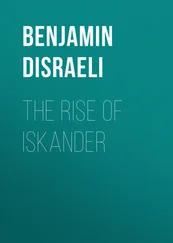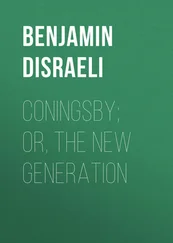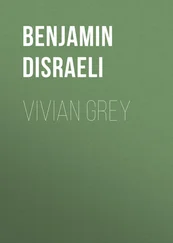Benjamin Disraeli - Henrietta Temple - A Love Story
Здесь есть возможность читать онлайн «Benjamin Disraeli - Henrietta Temple - A Love Story» — ознакомительный отрывок электронной книги совершенно бесплатно, а после прочтения отрывка купить полную версию. В некоторых случаях можно слушать аудио, скачать через торрент в формате fb2 и присутствует краткое содержание. Жанр: literature_19, foreign_antique, foreign_prose, Зарубежные любовные романы, на английском языке. Описание произведения, (предисловие) а так же отзывы посетителей доступны на портале библиотеки ЛибКат.
- Название:Henrietta Temple: A Love Story
- Автор:
- Жанр:
- Год:неизвестен
- ISBN:нет данных
- Рейтинг книги:5 / 5. Голосов: 1
-
Избранное:Добавить в избранное
- Отзывы:
-
Ваша оценка:
- 100
- 1
- 2
- 3
- 4
- 5
Henrietta Temple: A Love Story: краткое содержание, описание и аннотация
Предлагаем к чтению аннотацию, описание, краткое содержание или предисловие (зависит от того, что написал сам автор книги «Henrietta Temple: A Love Story»). Если вы не нашли необходимую информацию о книге — напишите в комментариях, мы постараемся отыскать её.
Henrietta Temple: A Love Story — читать онлайн ознакомительный отрывок
Ниже представлен текст книги, разбитый по страницам. Система сохранения места последней прочитанной страницы, позволяет с удобством читать онлайн бесплатно книгу «Henrietta Temple: A Love Story», без необходимости каждый раз заново искать на чём Вы остановились. Поставьте закладку, и сможете в любой момент перейти на страницу, на которой закончили чтение.
Интервал:
Закладка:
‘Mamma! is London twenty times bigger than Nottingham? How big is it, then? Shall we travel all night? What o’clock is it now? I wonder if Thursday will ever come? I think I shall go to bed early, to finish the day sooner. Do you think my cap is good enough to travel in? I shall buy a hat in London. I shall get up early the very first morning, and buy a hat. Do you think my uncle is in London? I wish Augustus were not at Eton, perhaps he would be there. I wonder if Mr. Glastonbury will take me to see St. Paul’s! I wonder if he will take me to the play. I’d give anything to go to the play. I should like to go to the play and St. Paul’s! What fun it will be dining on the road!’
It did indeed seem that Thursday would never come; yet it came at last. The travellers were obliged to rise before the sun, and drive over to Nottingham to meet their coach; so they bid their adieus the previous eve. As for Ferdinand, so fearful was he of losing the coach, that he scarcely slept, and was never convinced that he was really in time, until he found himself planted in breathless agitation outside of the Dart light-post-coach. It was the first time in his life that he had ever travelled outside of a coach. He felt all the excitement of expanding experience and advancing manhood. They whirled along: at the end of every stage Ferdinand followed the example of his fellow-travellers and dismounted, and then with sparkling eyes hurried to Glastonbury, who was inside, to inquire how he sped. ‘Capital travelling, isn’t it, sir? Did the ten miles within the hour. You have no idea what a fellow our coachman is; and the guard, such a fellow our guard! Don’t wait here a moment. Can I get anything for you? We dine at Mill-field. What fun!’
Away whirled the dashing Dart over the rich plains of our merry midland; a quick and dazzling vision of golden corn-fields and lawny pasture land; farmhouses embowered in orchards and hamlets shaded by the straggling members of some vast and ancient forest. Then rose in the distance the dim blue towers, or the graceful spire, of some old cathedral, and soon the spreading causeways announced their approach to some provincial capital. The coachman flanks his leaders, who break into a gallop; the guard sounds his triumphant bugle; the coach bounds over the noble bridge that spans a stream covered with craft; public buildings, guildhalls, and county gaols rise on each side. Rattling through many an inferior way they at length emerge into the High Street, the observed of all observers, and mine host of the Red Lion, or the White Hart, followed by all his waiters, advances from his portal with a smile to receive the ‘gentlemen passengers.’
‘The coach stops here half an hour, gentlemen: dinner quite ready!’
‘Tis a delightful sound. And what a dinner! What a profusion of substantial delicacies! What mighty and iris-tinted rounds of beef! What vast and marble-veined ribs! What gelatinous veal pies! What colossal hams! Those are evidently prize cheeses! And how invigorating is the perfume of those various and variegated pickles! Then the bustle emulating the plenty; the ringing of bells, the clash of thoroughfare, the summoning of ubiquitous waiters, and the all-pervading feeling of omnipotence, from the guests, who order what they please, to the landlord, who can produce and execute everything they can desire. ‘Tis a wondrous sight. Why should a man go and see the pyramids and cross the desert, when he has not beheld York Minster or travelled on the Road! Our little Ferdinand amid all this novelty heartily enjoyed himself, and did ample justice to mine host’s good cheer. They were soon again whirling along the road; but at sunset, Ferdinand, at the instance of Glastonbury, availed himself of his inside place, and, wearied by the air and the excitement of the day, he soon fell soundly asleep.
Several hours had elapsed, when, awaking from a confused dream in which Armine and all he had lately seen were blended together, he found his fellow-travellers slumbering, and the mail dashing along through the illuminated streets of a great city. The streets were thickly thronged. Ferdinand stared at the magnificence of the shops blazing with lights, and the multitude of men and vehicles moving in all directions. The guard sounded his bugle with treble energy, and the coach suddenly turned through an arched entrance into the court-yard of an old-fashioned inn. His fellow-passengers started and rubbed their eyes.
‘So! we have arrived, I suppose,’ grumbled one of these gentlemen, taking off his night-cap.
‘Yes, gentlemen, I am happy to say our journey is finished,’ said a more polite voice; ‘and a very pleasant one I have found it. Porter, have the goodness to call me a coach.’
‘And one for me,’ added the gruff voice.
‘Mr. Glastonbury,’ whispered the awe-struck Ferdinand, ‘is this London?’
‘This is London: but we have yet two or three miles to go before we reach our quarters. I think we had better alight and look after our luggage. Gentlemen, good evening!’
Mr. Glastonbury hailed a coach, into which, having safely deposited their portmanteaus, he and Ferdinand entered; but our young friend was so entirely overcome by his feelings and the genius of the place, that he was quite unable to make an observation. Each minute the streets seemed to grow more spacious and more brilliant, and the multitude more dense and more excited. Beautiful buildings, too, rose before him; palaces, and churches, and streets, and squares of imposing architecture; to his inexperienced eye and unsophisticated spirit their route appeared a never-ending triumph. To the hackney-coachman, however, who had no imagination, and who was quite satiated with metropolitan experience, it only appeared that he had had an exceeding good fare, and that he was jogging up from Bishopsgate Street to Charing Cross.
When Jarvis, therefore, had safely deposited his charge at Morley’s Hotel, in Cockspur Street, and extorted from them an extra shilling, in consideration of their evident rustication, he bent his course towards the Opera House; for clouds were gathering, and, with the favour of Providence, there seemed a chance about midnight of picking up some helpless beau, or desperate cabless dandy, the choicest victim, in a midnight shower, of these public conveyancers.
The coffee-room at Morley’s was a new scene of amusement to Ferdinand, and he watched with great diversion the two evening papers portioned out among twelve eager quidnuncs, and the evident anxiety which they endured, and the nice diplomacies to which they resorted, to obtain the envied journals. The entrance of our two travellers so alarmingly increasing the demand over the supply, at first seemed to attract considerable and not very friendly notice; but when a malignant half-pay officer, in order to revenge himself for the restless watchfulness of his neighbour, a political doctor of divinity, offered the journal, which he had long finished, to Glastonbury, and it was declined, the general alarm visibly diminished. Poor Mr. Glastonbury had never looked into a newspaper in his life, save the County Chronicle, to which he occasionally contributed a communication, giving an account of the digging up of some old coins, signed Antiquarius; or of the exhumation of some fossil remains, to which he more boldly appended his initials.
In spite of the strange clatter in the streets, Ferdinand slept well, and the next morning, after an early breakfast, himself and his fellow-traveller set out on their peregrinations. Young and sanguine, full of health and enjoyment, innocent and happy, it was with difficulty that Ferdinand could restrain his spirits as he mingled in the bustle of the streets. It was a bright sunny morning, and although the end of June, the town was yet quite full.
‘Is this Charing Cross, sir? I wonder if we shall ever be able to get over. Is this the fullest part of the town, sir? What a fine day, sir! How lucky we are in the weather! We are lucky in everything! Whose house is that? Northumberland House! Is it the Duke of Northumberland’s? Does he live there? How I should like to see it! Is it very fine? Who is that? What is this? The Admiralty; oh! let me see the Admiralty! The Horse Guards! Oh! where, where? Let us set our watches by the Horse Guards. The guard of our coach always sets his watch by the Horse Guards. Mr. Glastonbury, which is the best clock, the Horse Guards, or St. Paul’s? Is that the Treasury? Can we go in? That is Downing Street, is it? I never heard of Downing Street. What do they do in Downing Street? Is this Charing Cross still, or is it Parliament Street? Where does Charing Cross end, and where does Parliament Street begin? By Jove, I see Westminster Abbey!’
Читать дальшеИнтервал:
Закладка:
Похожие книги на «Henrietta Temple: A Love Story»
Представляем Вашему вниманию похожие книги на «Henrietta Temple: A Love Story» списком для выбора. Мы отобрали схожую по названию и смыслу литературу в надежде предоставить читателям больше вариантов отыскать новые, интересные, ещё непрочитанные произведения.
Обсуждение, отзывы о книге «Henrietta Temple: A Love Story» и просто собственные мнения читателей. Оставьте ваши комментарии, напишите, что Вы думаете о произведении, его смысле или главных героях. Укажите что конкретно понравилось, а что нет, и почему Вы так считаете.












